
Friends, I am thrilled today to introduce to you Author D. H. Beckwith. I have critiqued with Don for years, and not only is his art knowledge extraordinary, his protagonist Roscoe Pine is one of my favorite characters–and as much as I read, that’s saying a lot! Please welcome D. H. Beckwith to Help From My Friends Friday. ~ Donnell
By: D. H. Beckwith
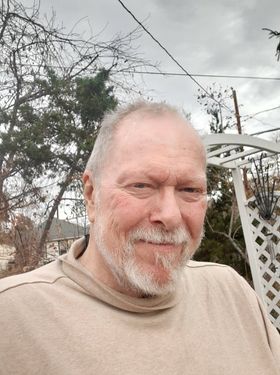
Author D. H. Beckwith
When I was a young boy, my mother began showing me the paintings of the Dutch and Flemish Masters. Then she pointed out the beauty and symmetry of ancient Greek and Roman sculpture. Perhaps your parents steeped you in your prayers or your family history or some wonderful children’s poems. I was steeped in art. It lives inside me, just as those young people’s poetry and stories live inside you.
Mom never got me to contemporary or modern art, but she opened the doorway to it. I was not an art history major in college, but I took enough courses and visited enough galleries and museums that I further developed my interest and my love. In my early twenties I lived in the East Village of New York, among artists of many stripes. Most of them weren’t going anywhere, but some were, and I learned to love their dedication – all of them, the good artists and the bad.
Lucky for me, I lived in New York City, the home of the Met, the Modern, the Frick, the Whitney, the Brooklyn, and the Guggenheim. My second career was as a caterer and event planner. Over the course of fifteen years I created scores of special events for the Solomon R. Guggenheim Museum on upper Fifth Avenue. I grew familiar with their permanent collections, particularly the Thannhauser Wing, which offered up some of the world’s best-known Impressionist and post-Impressionist art.
And then there were the shows. For weeks and months at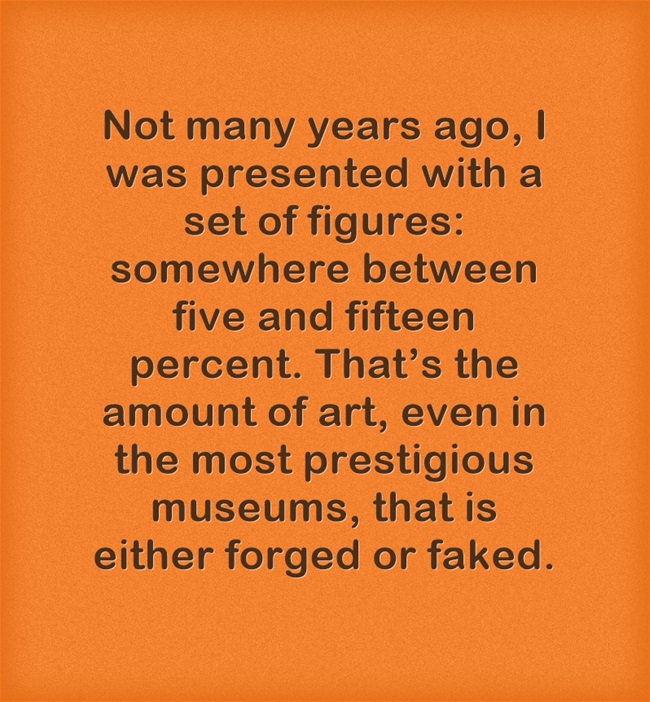 a time, they would fill the great spiral building with the works of Duchamp and deKooning, Pollock and Mondrian, Picasso and Braque. And that’s to say nothing of Rothko, Hockney, Klimt, Cezanne, Monet, and so many more. It was like being steeped all over again.
a time, they would fill the great spiral building with the works of Duchamp and deKooning, Pollock and Mondrian, Picasso and Braque. And that’s to say nothing of Rothko, Hockney, Klimt, Cezanne, Monet, and so many more. It was like being steeped all over again.
Not many years ago, I was presented with a set of figures: somewhere between five and fifteen percent. That’s the amount of art, even in the most prestigious museums, that is either forged or faked. Switzerland’s Fine Art Expert Institute goes so far as to estimate that a full half of all art in museums and galleries is fake. It’s a figure that is seriously doubted, but five-to-fifteen percent is bad enough. It can make you question what you are seeing.
It might be helpful to know the names of history’s greatest and most prolific art forgers. They would include John Myatt, Wolfgang Beltracchi, Eric Hebborn, and Elmyr de Hory. You might look them up. Some of their works could be worth millions or tens of millions of dollars. Perhaps the greatest of all was the Dutchman Han van Meegeren, who did his work in the first half of the Twentieth Century and was most famous for his forgeries of the paintings of Johannes Vermeer, no small feat.
These facts have long fascinated me. In my novel, Van Gogh Blues (an Amazon Kindle eBook written as D.H. Beckwith) I write about an imaginary scenario in which a manipulative monster of a man houses and directs a small coterie of extraordinary artists, all demented in one way or another and unable to live on their own and direct their own lives. They are technically brilliant and their works often end up in the most prestigious of art galleries, later being sold to unsuspecting people of wealth for enormous sums of money. Some of those paintings are donated to, and happily accepted by, top museums on the death of the foolish late-owners.
In a museum, most of what you see will be genuine – but not all of it.
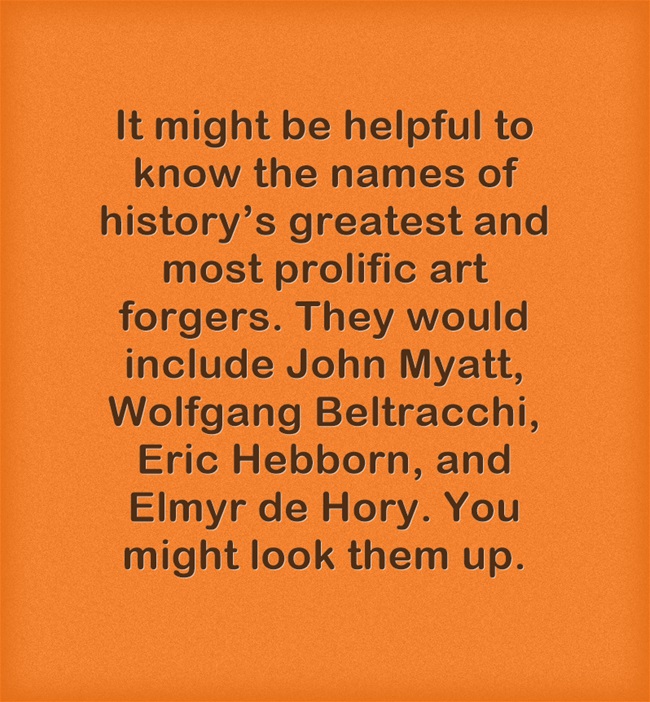 So, how could one tell if a supposed Rembrandt was genuine or not? An expert on Rembrandt might be able to tell just by looking. One might examine the brush strokes to compare them to the actual way Rembrandt wielded a brush. Then he or she would examine the artist’s color palette. Tiny dots of paint or microscopic particles of the canvas or the paper or the wooden board would be subjected to chemical or electronic analysis to determine their age or if, say, that particular paint mixture existed in Rembrandt’s day.
So, how could one tell if a supposed Rembrandt was genuine or not? An expert on Rembrandt might be able to tell just by looking. One might examine the brush strokes to compare them to the actual way Rembrandt wielded a brush. Then he or she would examine the artist’s color palette. Tiny dots of paint or microscopic particles of the canvas or the paper or the wooden board would be subjected to chemical or electronic analysis to determine their age or if, say, that particular paint mixture existed in Rembrandt’s day.
But, you ask, with all this ability to determine legitimacy, how can there still be five to fifteen percent of the art in a museum that is fake? The answer is, don’t ask me. All that I can imagine is that a curator or the head of a museum would not want to risk knowing what may or may not be the truth about the institution’s prize possessions.
It’s not just art. Recently, testing was done on a set of the Dead Sea Scrolls and it was determined that all sixteen of the scrolls were modern fakes. Watch your back.
I write about art and antiquities, and I blend them with larceny, murder, betrayal, greed and temptation, with an occasional abduction thrown in to mix it up. My other novels are Corsica Blues, concerning the theft of some important paintings that are then secretly removed from the country.
My protagonist, art hunter Roscoe Pine, is sent to find them, rescue the suspected thief who is being held for ransom by Corsican Separatists, and return them all safely to the U.S.; and Hammurabi Blues, about a priceless artifact, desperately desired by a Middle Eastern nation willing to pay more than a hundred million dollars for its safe return.
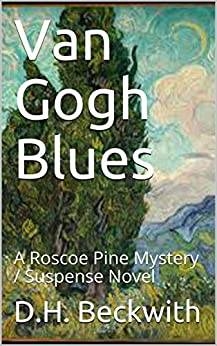 About Van Gogh Blues: An art hunter calls on one secretive forger after another attempting to worm his way into the modern world of counterfeit art. Eventually he encounters Zee, the mysterious mastermind of an oddball coterie of forgers who have become exacting specialists in duplicating the works and styles of the masters, both classic and modern. But when Roscoe Pine gets too close to the truth about that van Gogh drawing, he finds his life in danger of coming to an abrupt end.
About Van Gogh Blues: An art hunter calls on one secretive forger after another attempting to worm his way into the modern world of counterfeit art. Eventually he encounters Zee, the mysterious mastermind of an oddball coterie of forgers who have become exacting specialists in duplicating the works and styles of the masters, both classic and modern. But when Roscoe Pine gets too close to the truth about that van Gogh drawing, he finds his life in danger of coming to an abrupt end.
Going up against desperate criminals continually places Pine’s life in jeopardy and he always seems to return home to the woman he loves worse for the wear.
To find D.H. Beckwith’s Amazon Kindle eBooks
https://www.amazon.com/s?k=d.h.+beckwith&rh=n%3A154606011&ref=nb_sb_noss


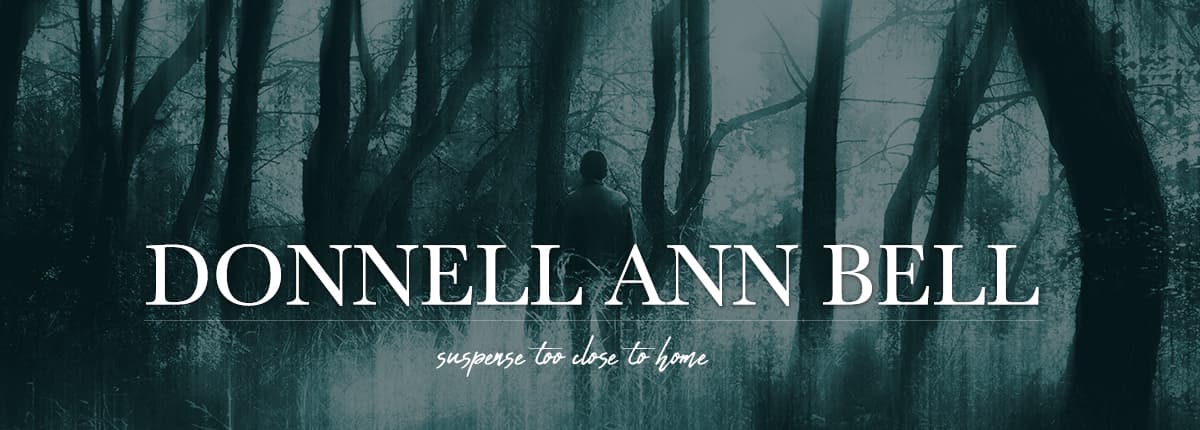
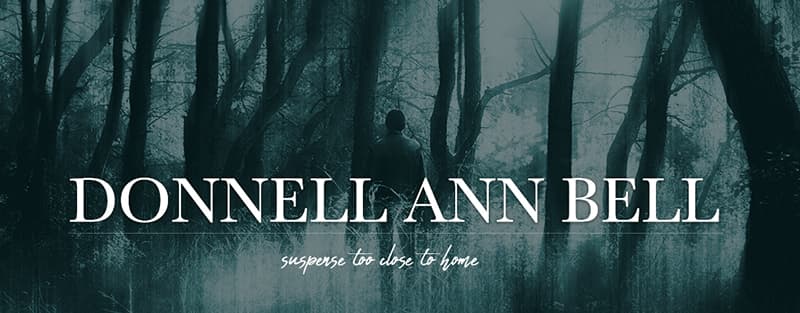







Mr. Beckwith, this is fascinating information. I knew forgery was widespread, but had no idea so many artworks in museums could be forgeries. It’s particularly interesting to me because my current work in progress is a romantic suspense that involves art forgery. Thank you for an illuminating post.
Oh, this is right up my alley, so nice to meet you D.H.!
I’ve always been fascinated with art forgery, art theft, Thomas Crowne Affair type movies, etc.
I wrote several romantic suspenses a few years ago that touched on the subjects (Gardner Museum theft/FBI hunt) and have read Eric Hebborn’s “The Art Forger’s Handbook” on how to create an undetectable forgery as well as Thomas Hoving’s “False Impressions.”
Your novel sounds intriguing!
So nice to read your blog, D.H.! I’m an avid reader of art fiction, art fraud, art theft and art in general. So, I’m happy to go find your work. I have about ten books on my shelf now, all to do with forgery and the art world. Love the topic!
Fascinating information. The percentage of fakes is astounding. I had no idea. Can’t wait to start on your series.
I’ve read Roscoe Pine in critique and he’s a fun character. Well worth buying. I don’t have Don’s background in art, but I’ve always been fascinated with the art scene for mysteries. Recently clipped a list of such books from Crime Reads.
Thanks to everyone for your lovely comments. Some of you may read my books and I sincerely hope you enjoy them. My plan is to begin another Roscoe novel in January.